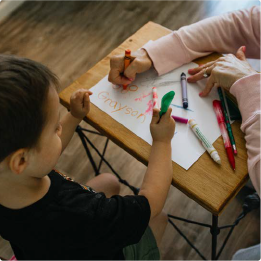Working hours
Mon - Fri: 8am to 5pm
Mon - Fri: 8am to 5pm

Quality Interactions – Enhancing Communication and Connections in Early Years
This course is designed to equip practitioners with the essential skills and knowledge to foster quality interactions with children. Quality interactions are fundamental to a child’s development, impacting their behaviour, self-regulation, and readiness for school. These interactions also play a crucial role in forming secure attachments with children and building relationships with their parents.
Understanding how to engage in effective verbal and non-verbal communication is key to this process. In this training, we will explore the types of communication that support secure attachments, and how these interactions can scaffold learning. Additionally, we will discuss the importance of adapting communication to meet the needs of children with Special Educational Needs (SEN) and those for whom English is an Additional Language (EAL).
You will learn how every interaction counts, and the significant role these interactions play in preparing children for their future learning and development.
This Quality Interactions course will enable practitioners to:
For more detailed information about booking training courses see our Training FAQ’s
This is essential training for staff dedicated to making every interaction count in an Early years setting, ensuring children are supported in their growth and development through positive, impactful communication.
Please note these courses are 4 days combined - Two sessions over zoom and Two Sessions in person. When you book you are booking 4 events in one for £90
To book this course, select your preferred date and the number of tickets required.
To book this course please select the number of places you want and add to the basket

We can deliver to either your individual setting or to a group of settings arranged by yourself.
To find out more about this then please either…

We are currently delivering our courses via Zoom Live. We use a lot of different methods to make sure courses are as interactive as possible and do expect delegates to have cameras on and sound on when required. We also request that you take part in the feedback on our courses so that we can improve our services every time. We provide individual certificates for all of our courses.
Millennium House, High Street,
Studley, Warwickshire, B80 7HJ.